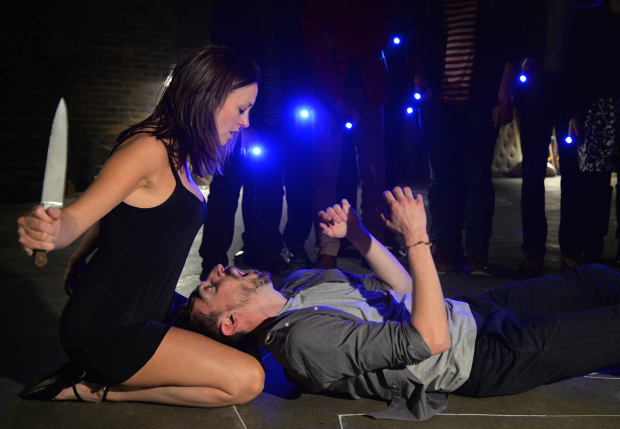Betrayal: A polyphonic crime drama (Village Underground)

© Mark Allan
Let’s horsetrade a few stars. My rather mean rating of two stems from the overcrowding in this church-sized space beneath the London Overground. With a little more room for the audience to breathe and circulate we might have been talking three at least, although from my own partial experience tucked away in one corner I don’t say that with any confidence.
Betrayal: A polyphonic crime drama (as opposed to Betrayal, a play by Harold Pinter) is a misbegotten attempt at immersive theatre that houses within it a startling concert of music by one of the 16th century’s most intriguing composers.
In 1590, Carlo Gesualdo visited a crime passionnel upon his wife and her aristocratic lover that was so spectacularly bloody it’s surprising Ken Russell never made a film of it. A gore-fest of murder, mutilation and second helpings (after the carnage he insisted on returning to the bedroom for another stab), it cemented the composer’s place in history more indelibly than his music ever did.
What any of that has to do with director John LaBouchardière‘s stygian night in Shoreditch is anybody’s guess. Six singers are paired with six dancers (I take it on trust that there were six couples since, like most spectators, I only clapped eyes on two or three) to play out an hour of inconsequential writhing over a crime-scene chalk mark. It’s distinctly sub-Punchdrunk and cries out for some of Maxine Doyle’s choreographic boldness.
The problems begin well before the beginning, with peremptory herding ("Take a torch and be quiet" was my greeting) and shushing. To be fair, the publicity warns that there are no toilets and nowhere to sit down, but it doesn’t mention the strength-sapping concrete floor you’ll be standing on, nor the fact that it helps to be six feet tall in order to rubberneck your way through the Renaissance rush hour.
Yet when Robert Hollingworth‘s group I Fagiolini send 17 of Gesualdo’s Madrigali wafting into the ether, much is forgiven. Theirs is the evening’s pleasure, and had I not been on critical duty I’d have joined the wise folk who extricated themselves from the visual experience and leaned against a wall or pillar, eyes closed, to absorb music that arose from hither and yon, melded in the air and fell upon their ears.
Hollingworth has chosen madrigals whose texts blend love and death, agony and bliss. Juxtapositions abound – ‘O dolorosa gioia/O soave dolore’ (‘O painful joy/O sweet pain’) – and suggest, just maybe, that Gesualdo himself struggled to distinguish between these extremes of emotion. His music crunches through stark polyphonic clashes with the kind of relish you’d expect from a latterday composer like Peter Maxwell Davies, and the half-dozen singers, each of them busily thrashing away with a dancing partner, deliver this hypnotic material with total control and pinpoint harmonisation.
– Betrayal: A polyphonic crime drama plays for two more performances at Village Underground today, 15 May, then tours to Cambridge and Salisbury










